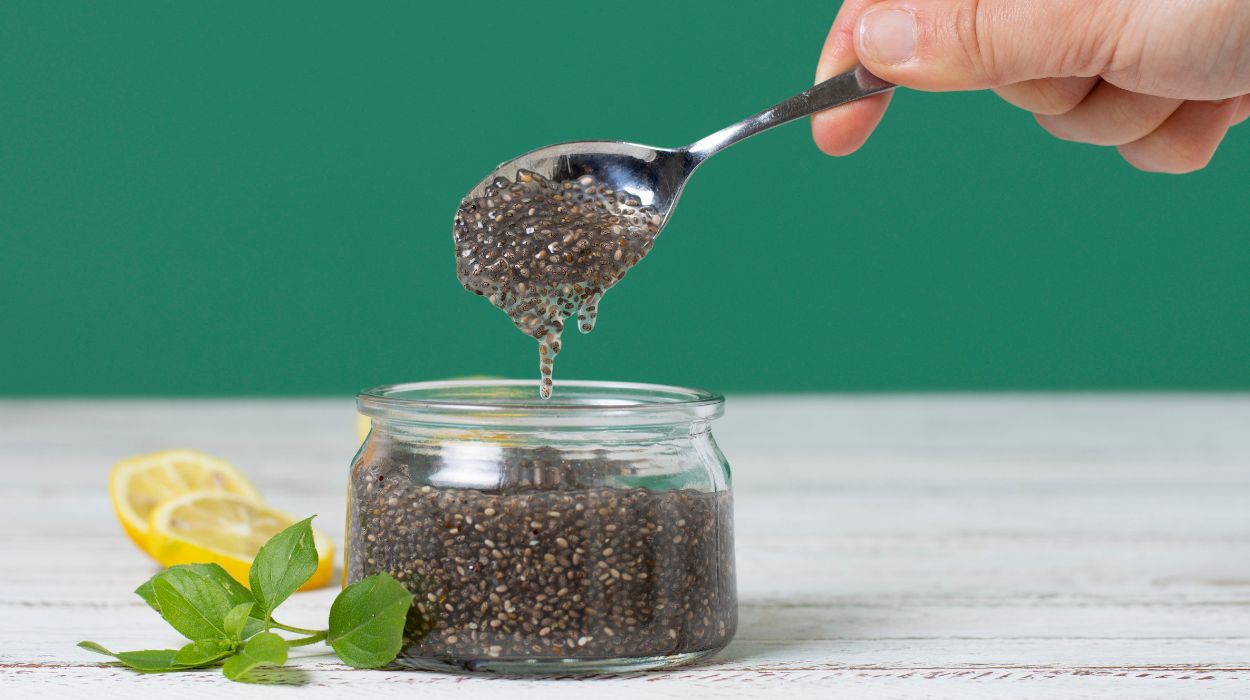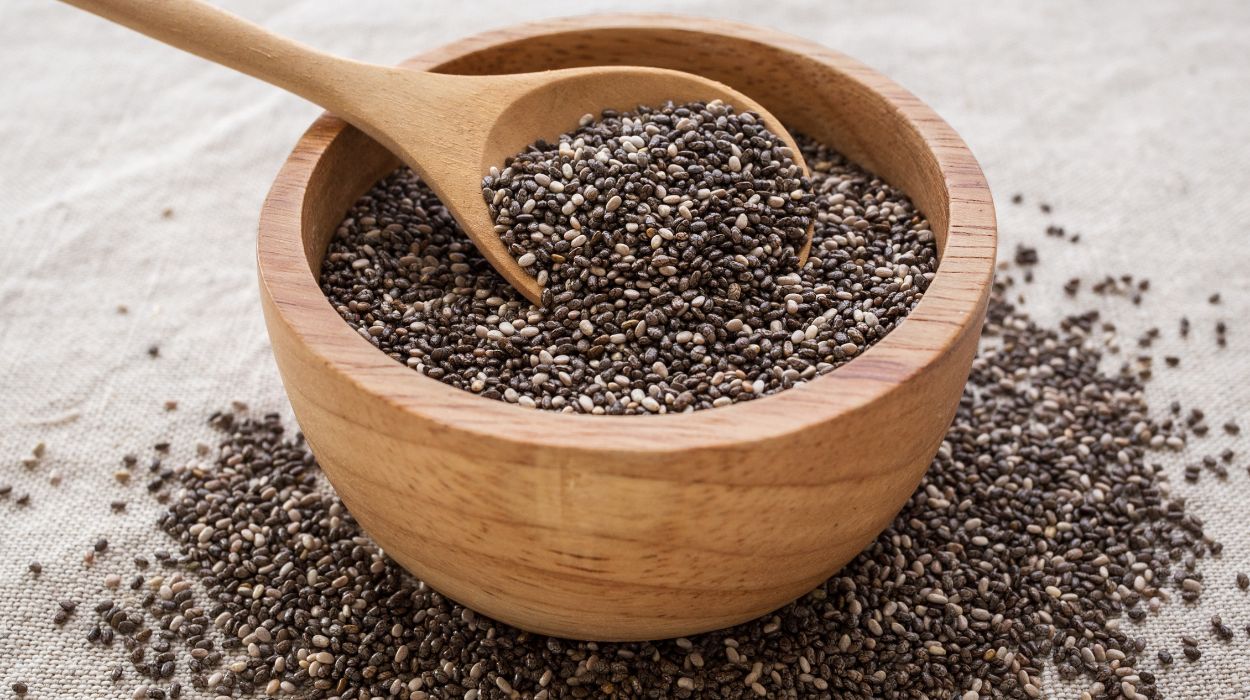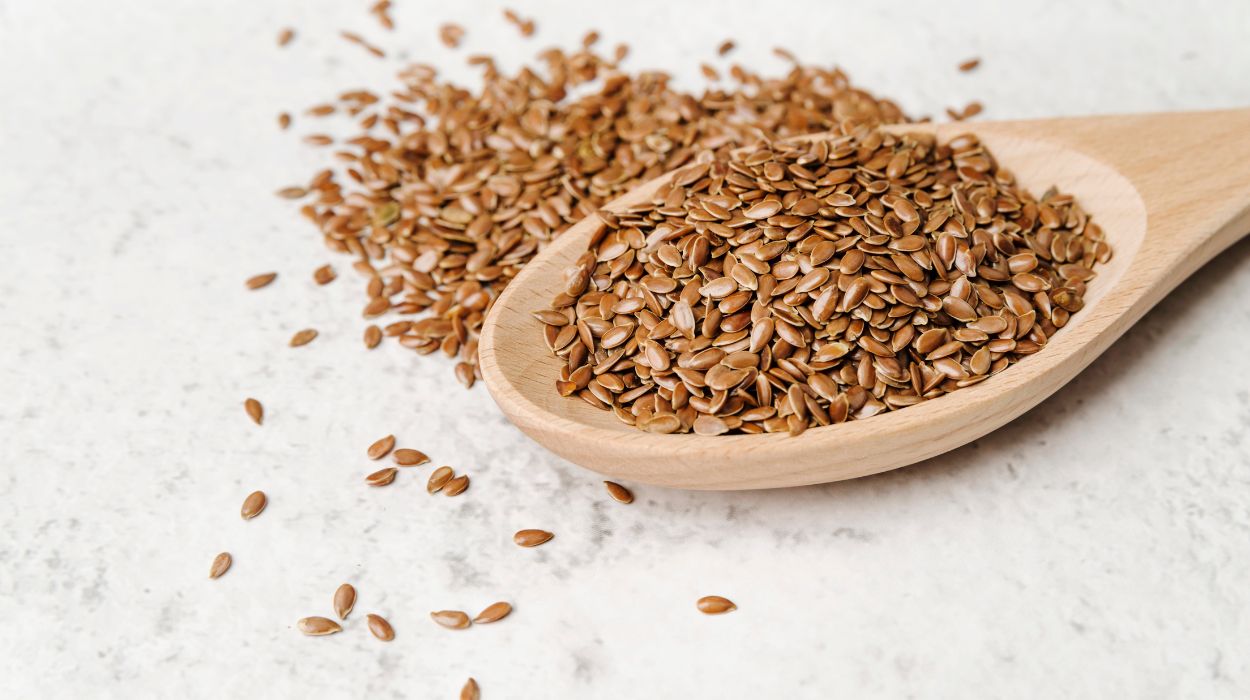 Evidence Based
Evidence Based
Evidence Based
This article is objectively based on relevant scientific literature, written by experienced medical writers, and fact-checked by a team of degreed medical experts.
Our team of registered dietitian nutritionists and licensed medical professionals seek to remain objective and unbiased while preserving the integrity of any scientific debate.
The articles contain evidence-based references from approved scientific sites. The numbers* in parentheses (*1,2,3) will take you to clickable links to our reputable sources.
Chia Seeds Side Effects That You Need To Know 2024

Chia seeds, famous for their role in everything from vegan baking substitution to the chia pets we remember from childhood, are generally regarded as a superfood for many reasons. As with anything, however, it is possible to have too much of a good thing.
While chia seeds are incredibly nutritious, they aren’t always completely harmless. For a certain subset of people they may be better off substituting chia with something equally nutritious.
A few potential side effects of chia seeds may include low blood pressure, constipation, and dangerous medical interactions in certain situations.
How can you reduce these risk factors when eating chia seeds? Portion and preparation are two of the best ways to ensure that you don’t run into any trouble while indulging.
Side Effects Of Chia Seeds
Some dangers of chia seeds include potential gastrointestinal issues like:
- Bloating and gas, particularly when consumed in excessive amounts or without adequate liquid.
- High fiber content may lead to constipation if not consumed with sufficient water
Individuals with swallowing difficulties or certain medical conditions, like esophageal narrowing or difficulty swallowing, should exercise caution when consuming chia seeds, as they can swell and form a gel-like substance when exposed to liquids.
Chia Seeds Side Effects To Watch Out For!
The big problem with eating too many chia seeds appears to have less to do with the amount that you’re eating and more to do with the way that they’re prepared and ingested.
In an optimal setting[1], chia seeds may help you lose weight, lower your systolic blood pressure, reduce your cholesterol, and even prevent blood sugar spikes in those with diabetes. However, these benefits may end up doing you more harm than good if you’re prescribed certain types of medications, for example.
If you’re not currently on blood thinners but are worried about your digestion, there are options that allow you to still include chia in your diet.
For example, instead of avoiding chia seeds outright, you should instead avoid consuming chia seeds that are not prepared in the right form for optimal nutritional absorption.
We’ll get to the best ways to process chia seeds for smoothies, vegan baking, and more in a moment. But first -other risk factors of chia seeds do you need to worry about?
Omega-3 Fatty Acids: A Potentially Dangerous Blood Thinner
Chia seeds are famous for being an abundant source of vegan alpha-linolenic acid, an omega-3 fatty acid vital to human brain function.
Omega-3 fatty acids are certainly part of a balanced diet for many ordinary people. In some cases, however, the blood-thinning effect of omega-3’s may potentially interact negatively with several types of blood-thinning medications, as well as some types of blood cholesterol management medications.
Individuals who take any of the following may be well-advised to consume fewer chia seeds daily than the average person, or even to avoid chia seed supplementation in any form:
- Warfarin (Coumadin)
- Aspirin
- Atorvastatin (Lipitor)
- Rosuvastatin (Crestor)
- Fluvastatin (Lescol)
- Lovastatin (Mevacor)
- Simvastatin (Zocor)
- Pravastatin (Pravachol)
If you take any of these medications and eat chia seeds regularly, we’ll discuss some of the best chia seed alternatives below.
How Much Fiber Is Too Much Fiber?
Aside from these risk factors, too much fiber from too many high-fiber foods daily imposes its own brand of mayhem on your gut health. Eating more than 60 grams of fiber per day may make it more difficult for your body to absorb[2] the vitamins, minerals, and other nutrients that your food contains.
You may also experience undue digestive discomfort, especially if your diet did not previously include enough dietary fiber, to begin with. Gas, diarrhea, nausea, bloating, constipation, and other related symptoms may be made even worse if you’re also not hydrating properly.
The elderly are at particular risk of becoming dehydrated, as are those who have previously undergone gastrointestinal surgery. Consult the professional medical advice of your physician if you have concerns.
Health Benefits Of Chia Seeds

Chia seeds offer a multitude of health benefits packed into tiny seeds. Rich in fiber, protein, omega-3 fatty acids, and antioxidants, they support various aspects of well-being.
One key advantage is their digestive support. The high fiber content aids in regular bowel movements and fosters a healthy gut environment. Additionally, the gel-like consistency they form when mixed with liquid can alleviate gastrointestinal discomfort.
Moreover, chia seeds are renowned for heart health. Omega-3 fatty acids, particularly ALA, help lower cholesterol, reduce inflammation, and regulate blood pressure, thus decreasing the risk of heart disease.
Furthermore, they aid in managing blood sugar levels. The combination of fiber, protein, and healthy fats slows down sugar absorption, making them beneficial for individuals with diabetes or seeking sustained energy levels. In summary, chia seeds provide a convenient and potent source of nutrition for overall health and vitality.
Chia Seed Substitutes
Who would have ever thought that something like chia seeds could pose potential risks like the ones described above? The good news is that if you’re concerned, there are plenty of substitutes for dietary chia seeds. These alternatives also boast the same health benefits and fatty acid composition of chia seeds as well.
Food isolates like soy protein can certainly stand in if your smoothie is in desperate need of a vegan protein boost in lieu of your usual ground seed supplement. What else is there?
Flaxseeds

Flaxseed is one of the best substitutes for a chia seed egg in vegan baking. When flax is processed in a blender and soaked for up to half an hour, it offers chia seeds the same coagulation properties. They secrete a similar slimy product after being hydrated.
Alternative Flours
There are several quality alternatives to chia flour supplementation. Obviously, if you’re not gluten-free, wheat flour is the flour type of choice for many home cooks in America.
If you’ve got food allergies to deal with, flour substitutes like rice flour, cornmeal, teff flour, coconut flour, chickpea flour, and sorghum flour are all awesome alternatives.
How To Prepare Chia Seeds For Consumption?
Chia seeds are awesome for losing weight. If you’re not avoiding them for any of the reasons above aside from digestive discomfort, there are plenty of ways that you can make chia seeds more bioavailable to your body so it is absorbed more easily.
Chia seed flour, chia seed oil, and chia seed pudding are all awesome plant foods that promote weight loss. Here’s how you can transform these tiny seeds into an incredible source of protein, healthy fats, and dietary alpha-linolenic acid.
Soak Chia Seeds
Chia seeds are an incredibly nutrient-dense food, but it may be difficult to process the seeds whole without giving your digestive system a head start.
Martha Stewart recommends a ratio of around one cup of liquid to every quarter cup of chia seeds that you’re soaking. Stir the two together and give the mixture around twenty minutes to hydrate fully. The hydrated chia seed effect will cause them to take on a texture reminiscent of tapioca pudding, and you’ll be able to use them in any way that you want for up to five days.
Chia Fresca and chia seed pudding are two common and delicious ways to utilize cultivated chia grain. They’re quick and easy snacks and may help you avoid potential blood sugar spikes.
Ground Chia Seeds (Also Known As Chia Flour)
One way to use dry chia seeds is in the form of chia seed powder. You can use chia powder to supplement other flour types and mixtures, or you could soak the powder itself to create a chia egg, which can be used as a binding agent in vegan baked goods.
To make your own ground chia powder, just toss a bunch of chia seeds into your blender, flour mill, or mortar and pestle. Process them until they reach your desired consistency.
Grow Chia Sprouts
Sprouted foods are widely popular as part of the holistic health movement. Sprouting is the process in which seeds or spores germinate, grow shoots, and put on new leaves. To sprout seeds, fold them into a wet paper towel and leave them covered at room temperature for a day or two.
The process of sprouting makes everything, including grains, nuts, pulses, legumes, and seeds, much more bioactive and digestible for the human body. It also helps break these foods’ carbohydrates, proteins, and lipids down into simpler, more accessible compounds[3] for optimal absorption.
After sprouting chia seeds, you’ll enjoy more protein, more readily-digestible micronutrients, and a much smoother digestive process. You can eat them on salads, sandwiches, or in any other meal in need of a healthy green boost.
Conclusion
No bones about it: chia seeds are a great choice for those watching their blood sugar, body weight, and blood pressure.
However, if you are already on high blood pressure medication, you may want to think twice about adding chia due to a potential interaction. To stay on the safe side, we recommend that those in this category avoid chia seeds just like they would any other foods that put them at risk of fatal coronary heart disease, such as blood-thinning dark, leafy greens.
The overall nutritional benefits of chia seeds cannot be denied, but they’re not worth putting your health at risk. We can always recommend consulting with your physician if you’re not entirely sure what’s best for you.
+ 3 sources
Health Canal avoids using tertiary references. We have strict sourcing guidelines and rely on peer-reviewed studies, academic researches from medical associations and institutions. To ensure the accuracy of articles in Health Canal, you can read more about the editorial process here
- Teoh SL, Lai NM, Vanichkulpitak P, Vuksan V, Ho H, Chaiyakunapruk N. Clinical evidence on dietary supplementation with chia seed (Salvia hispanica L.): a systematic review and meta-analysis. Nutrition Reviews. 2018;76(4):219-242. doi:10.1093/nutrit/nux071
- Lattimer JM, Haub MD. Effects of Dietary Fiber and Its Components on Metabolic Health. Nutrients. 2010;2(12):1266-1289. doi:10.3390/nu2121266
- Ikram A, Saeed F, Afzaal M, et al. Nutritional and end‐use perspectives of sprouted grains: A comprehensive review. Food Science & Nutrition. 2021;9(8):4617-4628. doi:10.1002/fsn3.2408



